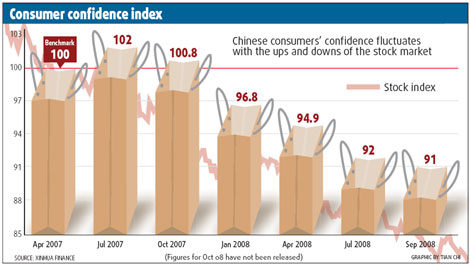
|
BIZCHINA> News
 |
|
Financial ill winds ruffle some feathers
By Tan Yingzi and Wang Hongyi (China Daily)
Updated: 2008-10-30 16:24
Their lifestyle is totally different from their parents'. They rarely hesitate before picking up a luxury product. They are part of the country's growing middle class, mostly white-collar workers - the big spenders and compulsive buyers. But with the US financial crisis starting to create ripples in China, these trendy young Chinese have realized the virtues of their parents' philosophy: A penny saved is a penny earned. This trend is most evident in big cities such as Beijing and Shanghai, where most of the multinational firms are based in the country. They have realized that it's difficult to say that the global financial meltdown won't hurt their life seriously, even though the Chinese economy has been in good shape till now.
"I have stopped my weekly visits to the beauty salon," says Gu Li, a senior researcher with a US software company. Thanks to her overseas education and working experience, she earns about $3,500 a month and lives a relatively cozy life in downtown Beijing. Her hobbies: buying designer brands, dining in trendy restaurants and visiting beauty salons once a week. "But now that the global financial crisis is worsening, I'm not sure I can afford such a lifestyle in future. Many US companies in China have already laid off a number of their employees or cut costs. So I should save more money and be prepared for the worst," she says. Gu has realized the threat she could face and shrunk her budget, even though her company is yet to cut costs. She has hired a maid to cook for her and has cut her visits to shopping malls. (See Budget saving) Gu is just one of the many young Chinese who have fallen back on the good old thrifty habits of their parents and are more than eager to share their budget tips with others. How to use money smartly has become a hot topic even on the forums of many popular shopping and dining websites, such as www.55bbs.com (I love discounts) and www.fantong.com (dinner bucket). "We have to lead a thrifty but smart life, especially during this financial crisis," says Zhao Yan, 30, a white-collar worker who often visits such websites for discount information and coupons. "Though most of the people around me have not felt the pinch of the crisis, it's still a good idea to take precautionary steps." The forums offer a good many suggestions on how to cut living cost. "Don't hang out too frequently spend more time at home reading, or playing poker or video games", "online shops are always cheaper than department stores" and "carry lunch to office" are a few of the popular suggestions on the websites. Even in the "trend capital" of Shanghai, many people with a weakness for luxury goods have cut the number of their visits to boutiques. "Some of my friends really like to buy designer brands. But, generally speaking, brands are less important now," says a 34-year-old woman surnamed Jiang. "We now talk more about food and oil prices, and the cost of living." Wearing a Chanel black top, embellished with studs and sequins, Jiang checks out a woolen skirt at Max Mara in Shanghai's Times Square. But, she says, "I don't plan to buy any of the top-end clothes now I will look for other middle-end brands." Around her, young couples and women carry mid-range brand products, evident from the labels on their shopping bags. The high-end Plaza 66, a landmark in Shanghai, is still packed with well-dressed people, especially young women. But these days they carry fewer shopping bags. Back in Beijing, Gu says: "I had no idea of thrifty living before. But I think it's a good thing for me and other young people. We should learn how to curb our growing material demands, and use our money smartly irrespective of a good or a bad economy." But there's a flip side to people reverting to thrifty ways: bad business for fancy restaurant and boutique owners. The catering industry is already feeling the pinch because quite a few people have curbed their visits to restaurants, especially the high-end ones. "Till recently, at least 20 people used to wait outside our restaurant during peak time," says an employee of a Japanese restaurant in Shanghai's business district. "But now there's almost nobody, though things are better over weekends." The growth of restaurant business has been slowing since the second half of this year, according to the Shanghai Restaurants' Association (SRA). "The stock market slump and the global financial crisis are the main reasons (for that)," says Xia Xiangqing, SRA marketing director. A shopkeeper selling one of the world's leading brand products in Shanghai says sales began falling from June, about 20 percent compared to the same period last year. "Most of the visitors today are our old customers. But even they just have a look and only few buy anything," he says. "White-collar workers are the main consumers of luxury goods in China. But with the stock market shrinking more than two-thirds and the economy being hurt by the global slowdown, the nouveaux riches are tightening their purse strings," says Liu Zheng, an analyst with SDR, a Beijing-based consultancy firm.
And as things stand now, this trend doesn't seem to end anytime soon, Liu says.
 (For more biz stories, please visit Industries)
|